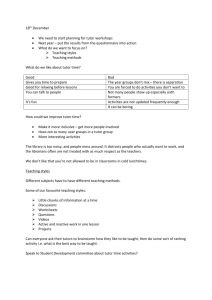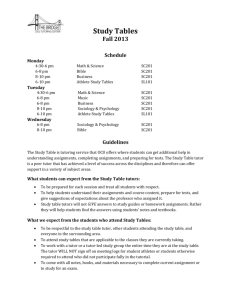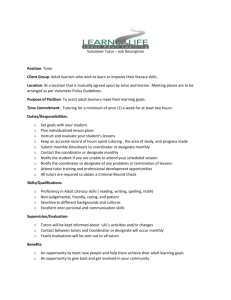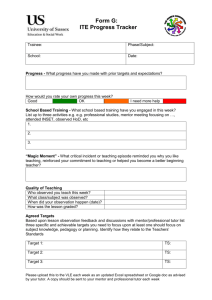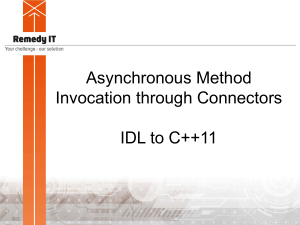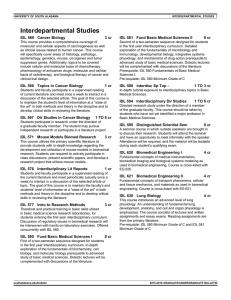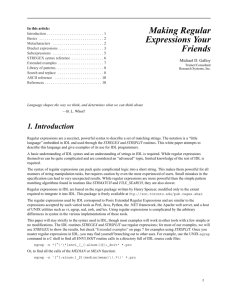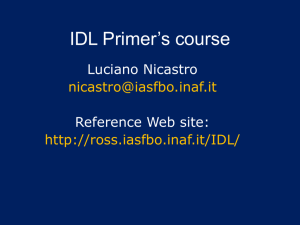Job Description - Heriot
advertisement
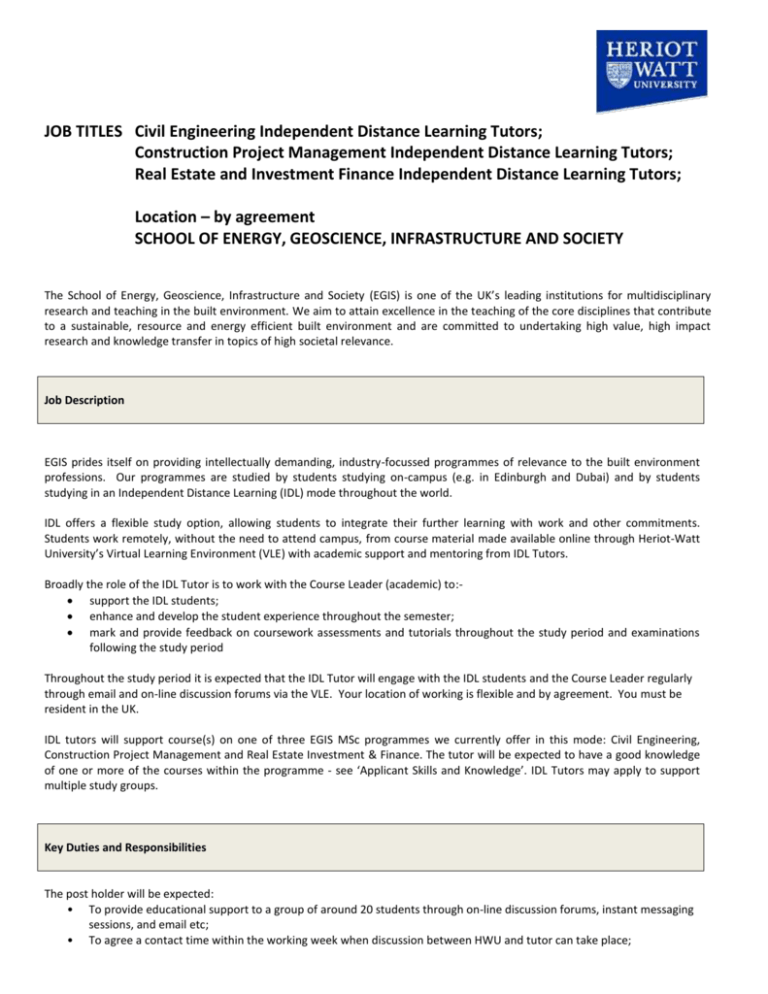
JOB TITLES Civil Engineering Independent Distance Learning Tutors; Construction Project Management Independent Distance Learning Tutors; Real Estate and Investment Finance Independent Distance Learning Tutors; Location – by agreement SCHOOL OF ENERGY, GEOSCIENCE, INFRASTRUCTURE AND SOCIETY The School of Energy, Geoscience, Infrastructure and Society (EGIS) is one of the UK’s leading institutions for multidisciplinary research and teaching in the built environment. We aim to attain excellence in the teaching of the core disciplines that contribute to a sustainable, resource and energy efficient built environment and are committed to undertaking high value, high impact research and knowledge transfer in topics of high societal relevance. Job Description EGIS prides itself on providing intellectually demanding, industry-focussed programmes of relevance to the built environment professions. Our programmes are studied by students studying on-campus (e.g. in Edinburgh and Dubai) and by students studying in an Independent Distance Learning (IDL) mode throughout the world. IDL offers a flexible study option, allowing students to integrate their further learning with work and other commitments. Students work remotely, without the need to attend campus, from course material made available online through Heriot-Watt University’s Virtual Learning Environment (VLE) with academic support and mentoring from IDL Tutors. Broadly the role of the IDL Tutor is to work with the Course Leader (academic) to: support the IDL students; enhance and develop the student experience throughout the semester; mark and provide feedback on coursework assessments and tutorials throughout the study period and examinations following the study period Throughout the study period it is expected that the IDL Tutor will engage with the IDL students and the Course Leader regularly through email and on-line discussion forums via the VLE. Your location of working is flexible and by agreement. You must be resident in the UK. IDL tutors will support course(s) on one of three EGIS MSc programmes we currently offer in this mode: Civil Engineering, Construction Project Management and Real Estate Investment & Finance. The tutor will be expected to have a good knowledge of one or more of the courses within the programme - see ‘Applicant Skills and Knowledge’. IDL Tutors may apply to support multiple study groups. Key Duties and Responsibilities The post holder will be expected: • To provide educational support to a group of around 20 students through on-line discussion forums, instant messaging sessions, and email etc; • To agree a contact time within the working week when discussion between HWU and tutor can take place; • • • • • • • • • • • • • • • • • To be familiar with course operation and set-up in VISION1; To be familiar with the technical and theoretical material that is provided for the course; To make contact and introductions to the allocated group of students in week 1 and to brief them of the contact arrangements and schedule that will operate throughout the Semester; To create a “space” within the VISION course where the students can discuss, communicate, exchange information as part of the learning process; To agree and develop an ‘enhanced’ learning experience for IDL students with the Course Leader; To respond to appropriate student questions within 5 working days; To guide students to appropriate Student Office help; To manage the assessment and feedback of coursework submission for the students; To judge the submission in terms of authenticity and plagiarism using the on-line TurnitIn system; To communicate with the Course Leader in matters where discipline, ‘authenticity of work’ and plagiarism are considered to be of concern; To mark coursework submissions and provide feedback, in accordance with set marking criteria, and within the VISION system; To prepare students appropriately for examination by helping with tutorial/past paper solutions, revision discussions etc; To mark examination scripts in accordance with guidelines set down by the Course Leader (moderator); To provide outline feedback to students within VISION; To return marked scripts and marks to School Office; To provide a report to the Course Leader reflecting on the operation of the course; To work with the Course Leader to ensure consistent marking standards across all markers. Please note that this job description is not exhaustive, and the role holder may be required to undertake other relevant duties commensurate with the grading of the post. Activities may be subject to amendment over time as the role develops and/or priorities and requirements evolve. IDL Development and Support An IDL Tutor during the course of employment will:• Achieve accreditation as an Approved Tutor within the University system; • Be allocated the necessary on-line accounts and registrations to the University’s on-line learning system VISION (Blackboard); • Receive a study pack including outline course strategy and main learning objectives of the course; • Be provided with an introductory briefing by the School; • Be allocated a tutor group of around 20 students; • Receive course materials such as notes, tutorials, worked examples etc.; • Be provided with on-going back-up from the Course Leader throughout the delivery period; • Be given advice on determining inappropriate academic methods (e.g. plagiarism by using on-line assessment engine and other techniques) • Be provided with assessment marking criteria, rubric and worked solutions; • Be given exemplar marked scripts; IT Requirements It is a requirement of the role to have access to a personal computer (PC) and you will be expected to have basic PC skills, basic digital literacy and be able to use standard office software e.g. word processing and e-mail. All courses supported by IDL Tutors require access to the internet as you will be required to regularly access information from a website, for example information relating to your tutor group. You will also be expected to mark your student's assignments using your PC. You will be required to use a HWU email account for administrative purposes and to make contact with and respond to your students and colleagues. HWU’s primary mechanism for communicating is via email. 1 VISION is the name given to HWU’s VLE which is based on Blackboard. The University uses methods of electronic communication and teaching through on-line learning systems. The online learning system means that IDL Tutor may use tools such as blogs, online forums, wikis and e-portfolios. You should ensure you have the necessary IT skills or are willing to undertake training to gain such skills. Job Title: Approved Tutor School/Section: School of Built Environment Payment: £2000 per study group of approx. 20 students. (IDL Tutors may apply to take on more than one study group for which they will receive additional payments). Reporting to: Director of Learning and Teaching Duration of Activity: approximately 15 weeks Start Date: August 2014 or January 2015 Approximate Time Commitment: Variable (typically up to 8 hours per week) Disclosure Scotland Requirement: N/A Person Specification This section details the attributes e.g. skills, knowledge/qualifications and competencies which are required in order to undertake the full remit of the role. Attributes Essential Education & Qualifications (technical, professional, academic qualifications and training required) Undergraduate degree in cognate discipline at 2:1 or above Desirable MSc in appropriate discipline. Means of Assessment Certificate PhD (or working towards completion of a PhD) in a relevant discipline Member of appropriate professional body Teaching qualification or in the process of completing this Experience Competencies, Skills& Knowledge (e.g. effective communication skills, initiative, flexibility, leadership etc) Teaching experience in Higher Education Commitment to supporting student study Experience of working in the relevant professional sector. Familiarity with virtual learning delivery platforms e.g. Blackboard, Moodle Excellent communications skills Knowledge of social media Computer literate Relevant team-working, Application form and interview Application form and interview interpersonal and management skills Fluency in the English Language Essential Criteria – these are attributes without which a candidate would not be able to undertake the full remit of the role. Applicants who do not clearly demonstrate in their application that they possess the essential requirements will normally be eliminated at the short listing stage. Desirable Criteria – these are attributes which would be useful for the candidate to hold. When short listing, these criteria will be considered when more than one applicant meets the essential criteria. Applicant Skills and Knowledge Civil Engineering Specific Skills Applications are sought from interested parties with experience and/or qualifications in most areas of Civil, Environmental and Structural Engineering. Applicants with a background in mathematics and/or physical sciences will also be considered for some posts. Each tutor will require a subset of some of the following areas of expertise: Urban hydrology, urban drainage and water supply. This understanding should include conventional sewerage systems, sustainable urban drainage systems (SUDS), the use of Infoworks CS and water supply. Soil mechanics and geotechnical engineering which should include relevant British Standards and Eurocodes. Structural engineering and applied mechanics. Mathematical techniques related to applied mechanics and dynamics. Characteristics of water and wastewater, the selection and design of unit processes and operations for potable water treatment, the selection and design of unit processes and operations for wastewater treatment, low-energy wastewater treatment systems, and the handling and disposal of sewage effluent and sludge, including their possible re-use. Urban hydrology, urban drainage and water supply. This understanding should include conventional sewerage systems, sustainable urban drainage systems (SUDS), the use of Infoworks CS and water supply. Sustainability in relation to professional practice in civil engineering and the built environment. General knowledge must be backed up by familiarity with a variety of case studies, measurement systems, international award systems (in particular CEEQUAL assessment), environmental impact assessment, planning procedures and practical solutions to problems. Earthquake engineering and dynamics of structures. Environmental geotechnics particularly contaminated land and soil remediation. Ground engineering and in particular site Investigation, slope stability, earth pressure, application of geotextiles and ground improvement Construction Project Management Specific Skills Applications are sought from interested parties with experience and/or qualifications in most areas of construction project management, technology and financial management. Each tutor will require a subset of some of the following areas of expertise. • • General project management body of knowledge and a good understanding of the construction process o Performance measurement and management o Lean management & lean construction o Supply chain management, strategic alliances & stakeholder management o People related issues, such as leadership, motivation, teamwork, etc. o Change management o Advanced procurement practices in the construction industry o Familiarity with Standard forms of contract (JCT, FIDIC, NEC etc.) o Contract administration (e.g. Claims; Negotiating; Managing Conflicts and Disputes) o Practical understanding of the value and risk management of the strategic and tactical development of construction projects Construction financial management o Economic decision analysis in construction o Corporate and financial planning, Project financial management, Corporate financial analysis • • Construction technology o A basic understanding of different elements that make-up a building – domestic to multi-storey construction o Structural requirements for buildings o Methods for substructure and superstructure construction o Principles of offsite and low-carbon construction Information technology o General knowledge of IT in construction Real Estate and Investment Finance Specific Skills Applications are sought from interested parties with experience and/or qualifications in most areas of real estate. Each tutor will require a subset of some of the following areas of expertise. • • • • • • • • • • Real estate and urban economics; Valuation and appraisal; Financial markets; Property markets and investment; Real estate development; Macroeconomic theory and practice International real estate markets; Planning and contract law; Planning system and its relationship with development and development management; Urban design and sustainability concepts and practice. Other Relevant Information The School of Energy, Geoscience, Infrastructure and Society, Heriot-Watt University The School of Energy, Geoscience, Infrastructure and Society has 80 academic staff, including 12 professors, 25 dedicated research staff and around 70 post-graduate research students. It enjoys facilities consistent with its location in modern, purpose-built accommodation on the Edinburgh campus, occupying two adjacent and linked buildings, the Arrol Building, named after the constructor of the Forth Rail Bridge, and the Chadwick Building, named after the Victorian social reformer. The School is well equipped in respect of laboratories for materials, structures, building services and hydraulics research and teaching. Teaching The School’s undergraduate teaching covers civil engineering, architectural engineering, construction project management, quantity surveying, real estate and town planning. In the 2012 National Student Survey each of our disciplines were in the top 10 in the UK. We offer a high quality educational experience underpinned by practical and laboratory teaching, and informed by contact with professional practice. Each of our degree programmes holds the appropriate accreditation from the relevant professional body. This educational philosophy ensures excellent employment prospects for all of our graduates. Programmes of postgraduate study are aligned to the expertise contained in each of our research institutes, ensuring that our postgraduate students benefit from state-of-the-art knowledge in their chosen study area. Research The School is one of the leading built environment research centres in the UK. It has sustained a high reputation for the international standing of its research over two decades. In the Research Assessment Exercise 2008, it returned to the Civil Engineering, Architecture & Built Environment and Town Planning units of assessment. In all three over 50% of its research was confirmed as world-leading or internationally recognised. Research within the School is organised into three Institutes: www.sbe.hw.ac.uk/research.htm The Institute for Infrastructure and Environment The Centre of Excellence in Sustainable Building Design The Institute Social Policy, Housing, Environment and Real Estate All academic staff based on the Edinburgh and Dubai campuses contribute to the research activities of one of our Institutes. These Institutes support a wide range of research activities relevant to the built environment. Institute staff undertake research funded by research councils, charitable foundations, local and national government. Research outcomes are published in leading international and national journals and key findings are widely disseminated through other media and forms of output. The Institute for Infrastructure and Environment (IIE) is world leading in civil engineering research, water management, railway engineering, cementitious materials and structural analysis. Further information can be obtained at http://www.sbe.hw.ac.uk/documents/IIE_Research_2012.pdf In the Centre of Excellence in Sustainable Building Design (CoFeX) staff are currently working in building drainage, acoustics, building simulation, low carbon buildings, construction management, town planning and urban design and are leading the way in providing research solutions to the challenges in these fields. Further information can be obtained at http://www.sbe.hw.ac.uk/documents/IBUD_Research.pdf (will be updated shortly) The Institute for Social Policy, Housing, Environment and Real Estate (ISPHERE) is among the UK’s top social and urban policy research centres with 25 per cent of its research outputs classed as ‘world leading’ in the UK Government’s 2008 Research Assessment Exercise. IHURER members have an outstanding track record of externally funded research, including research council and charitable funding as well as commissions from a wide range of government departments and agencies throughout the UK and beyond. Strong scholarship credentials are evident in the Institute's publication record. Between 2005 and 2010, the Institute produced 9 research-based books and nearly 60 refereed journal articles. Further information can be obtained at http://www.sbe.hw.ac.uk/documents/IHURER_Research_2012.pdf (will be updated shortly) Knowledge Exchange The School also has a growing profile based on public engagement and knowledge exchange (KE) activities, particularly in the areas of flood risk management, sustainable construction, facilities management and carbon management. Application Process To apply you must complete: An up to date CV demonstrating how you fully meet the person specification, skills and knowledge. You should also provide details of your Higher Education/additional studies and relevant employment history information. A Declaration of Eligibility to work in the UK Form -http://www.hw.ac.uk/hr/htm/forms/Declaration of Eligibility to work in the United Kingdom Casual Staff.doc Submit the above information via email to sbe-enquiries@hw.ac.uk with title “IDL Tutor Application”. Informal enquiries may be made to our IDL Programme Leaders: Civil Engineering: Dr. Alan Cuthbertson, a.cuthbertson@hw.ac.uk; 0131 451 8358 Construction Project Management: Dr Roshani Palliyaguru; r.palliyaguru@hw.ac.uk ; 0131-451-3154 Real Estate: Jimmy Morgan; james.morgan@hw.ac.uk ; 0131-451-3347 The University is committed to equality of opportunity. Heriot-Watt University and Values With a history dating back to 1821, Heriot-Watt University has established a reputation for world-class teaching and practical, leading-edge research, which has made us one of the top UK universities for business and industry. We are a vibrant, forward-looking university, well known for the quality of our degrees with employers actively seeking out our graduates. At Heriot-Watt University, we have created an environment that nurtures innovation and leadership - where our researchers, staff and students can realise their potential and develop their ambitions. We are proud of our collegiate atmosphere and integrated teaching and research approach which helps build a community of committed academics and highly motivated students. We have campuses in Edinburgh, the Borders, Orkney , Dubai and Malaysia where we aim to provide stimulating, supportive environments conducive to effective learning and research, and where staff and students can excel. At Heriot-Watt University, we have an established set of values that help us nurture innovation and leadership, and show our commitment to continuous improvement and development in all our activities. These values describe our community spirit and aspirations, characterising not only how we are as a higher education institution but framing how we want to be. Heriot-Watt's values are: o o o o o Valuing and respecting everyone Pursuing excellence Pride and belonging Shaping the future Outward looking We use these values as the building blocks of how we go about doing our work and how we conduct ourselves as part of Heriot-Watt University. They represent what binds us together as a University community and help us to become the best at what we do. It is key that all our staff feel part of our achievements, and our values provide your link to that success. For full details on Heriot-Watt University, please view our website, www.hw.ac.uk Heriot-Watt University is a charity registered in Scotland (SC000278).


